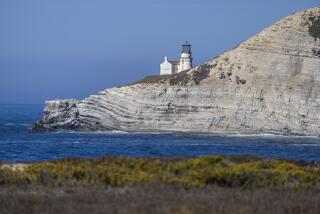Backers of Point Mugu, Rival Base Join Forces
- Share via
Setting aside years of mutual suspicion and distrust, boosters of the Point Mugu Navy base and a rival base in the Mojave Desert have agreed to work together for their mutual survival in an era of Pentagon cutbacks.
Community leaders supporting the Point Mugu and China Lake Navy bases--traditional rivals even though the bases fall under the same command--are drafting a formal mission statement for the new alliance.
The focus is on a common enemy: those East and Gulf Coast bases that are hogging the spoils left over from base closures.
“I think we buried the hatchet, maybe not very deep, but we started the burial,” said Supervisor John K. Flynn, who led a six-member delegation to the desert on Friday. “It is essential that both bases work together and look at those unifying issues.”
Members of the budding alliance plan to revive the concept of a “Southwest Complex” of military installations that would be the nation’s preeminent center to test missiles, aircraft and airborne weapons.
They have contacted supporters of Edwards Air Force Base and plan to extend the pact to other bases in the Southwest. With the combined clout, they hope to assemble a powerful group of Western congressional representatives to divert more work westward, said Phil Arnold, one of the leading community boosters of China Lake.
Both Point Mugu, near Oxnard, and China Lake, located 120 miles northeast in the upper Mojave Desert, have been test centers for missiles and other weaponry.
At times, their similar missions have brought on fierce competition for jobs and lucrative Pentagon contracts.
But defense contractors and local politicians in both communities have decided to rise above such minor clashes and focus on larger matches to come with the Navy’s Patuxent River base in Maryland and Eglin Air Force Base in Florida.
The Navy, they point out, is now spending tens of millions of dollars to build new facilities at Patuxent River, while Point Mugu and China Lake have empty hangars, buildings and runway space capable of handling more work.
Members of the new alliance, however, are reluctant to openly challenge the naval powers at Patuxent River, fearing a backlash from Navy brass or the area’s well-organized congressional delegation.
“We’re concerned about mobilizing the East Coast communities,” said Bill Simmons, coordinator of the Community-Navy Action Partnership. The group evolved from a former Ventura County task force to save Point Mugu during the last round of base closures.
The rivalry between Point Mugu and China Lake has been going on for years, and displayed no signs of diminishing in 1992, when the two bases were placed under one central command as the Naval Air Warfare Center, Weapons Division.
Indeed, it seemed to heat up during the consolidation as some programs moved from Point Mugu to China Lake, as did the admiral in charge of both bases.
Point Mugu officials believed that the admiral’s post would rotate between the two bases. That does not appear to be case.
Adm. J. Mike Boorda, chief of naval operations, recently brushed off a request from a Ventura County delegation to consider the rotation as a show of Navy support for Point Mugu.
“I’m afraid such a thing would be impractical to support since it would also involve ‘shuttle moves’ for the members of the flag staff who support the admiral,” Boorda wrote in a letter to the group’s Washington lobbyist.
The issue over the admiral did not come up during Friday’s meeting in Ridgecrest between the Ventura County delegation and members of the Indian Wells Valley 2000, a business group supporting China Lake.
Although the outcome was positive, the meeting itself was filled with long, awkward periods of silence as the two delegations faced each other for the first time, Flynn said.
At one point, the China Lake group excused itself to speak privately before continuing with the discussion.
“China Lake has always been a very aggressive, maverick organization in the minds of some,” said Arnold, who retired four years ago from China Lake as head of the weapons planning department. That has contributed to suspicion at Point Mugu about their Navy colleagues, he said.
“It was always felt stronger at Point Mugu, that the other guys were trying to get their work,” he said.
Yet Flynn and other local delegates came away with more compassion for China Lake and its adjacent town of Ridgecrest. The city of 30,000 has a much closer relationship with China Lake than Ventura County’s 720,000 residents have with Point Mugu.
It’s virtually a company town.
Both Point Mugu and China Lake have lost hundreds of jobs since the late 1980s due to ongoing defense cuts following the end of the Cold War.
Yet the impact has not been the same.
“They are in an awful lot of pain over there,” Simmons said of Ridgecrest. “When we lose jobs, the people get absorbed into other industries. When they lose jobs there, people move out of town and the sidewalks get deserted.”
More to Read
Sign up for Essential California
The most important California stories and recommendations in your inbox every morning.
You may occasionally receive promotional content from the Los Angeles Times.













